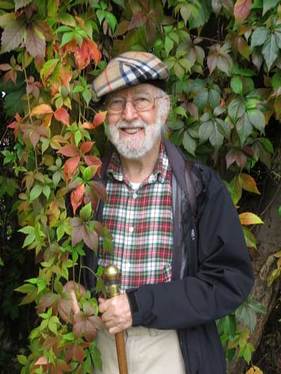
We met in a crypt of all places. In 1984 it still housed the Central London Samaritans and we were on the same evening shift. John lived in Stepney Green, at that time on my way home, so I started giving him lifts. I was soon invited to meet Lesley, and their daughter Alex (Libby was to arrive later). John and I became friends. And 33 years later his death makes the world feel empty to me.
Meeting John in a crypt, a place of death, was paradoxical, for John turned out to be – for me and so many others – a bringer, a re-invigorator, of life. Like all the most valuable of people he is not easy to describe. Australian, but anglophile and with a strong sense that Scotland was home (he visited it as often as he could but couldn’t I think ever have lived there). A former alcoholic who became a therapist, and although with no formal qualifications was a tremendous healer of bruised hearts and minds. Both a misanthrope and a lover of people. Wry and penetrating in his observations of the world and its inhabitants and with persistent, self-deprecating humour. He ran courses on assertiveness (at one stage for the Bank of England no less). He could be withering and had no time for phoney people but for others the power and depth of his attention and care was transformative.
When invited to any event involving more than two people he would, inexplicably, have a previous engagement. Like Kierkegaard, he sensed the untruth in many a crowd and formulaic exchange. As a boy he’d been beaten by Australian nuns and had no religious allegiance in adulthood, yet you’d be hard-pressed to find many others capable of such appreciative wonder and awe. “Have you been out yet? It’s the most magical day you ever saw in your life”. John was a disciple of gratitude. The ordinary could thrill him. He majored in childlike glee over a new sky, a discovered (or rediscovered) poem or insight, the tenor voice. We loved his oft-repeated line in self-mockery: “I know, I’m a great disappointment to myself”. I think, too, he knew fear, even despair.
His body, he always insisted, was a temporary vehicle. He respected but did not sentimentalise or (heaven forbid) immortalise it. “My soul has its roots in the soil/It’s my calm belief/That I’m just a leaf, this thing called ME/And will fall from the tree”. For John the human ego was something to make fun of. “Poor little ego says/‘where shall ME go when I am dead?/I’m filled with dread”. He adopted the saying attributed to the Roman playwright Terence: I am human, and nothing of that which is human is alien to me. It summed up something central (and hard won) about John.
Over these 33 years we have spoken to one another more or less at least every other day. Often the 'phoned exchanges were brief – a few minutes. But my, how I treasure the memory of them.
Order of service from John's memorial gathering
Meeting John in a crypt, a place of death, was paradoxical, for John turned out to be – for me and so many others – a bringer, a re-invigorator, of life. Like all the most valuable of people he is not easy to describe. Australian, but anglophile and with a strong sense that Scotland was home (he visited it as often as he could but couldn’t I think ever have lived there). A former alcoholic who became a therapist, and although with no formal qualifications was a tremendous healer of bruised hearts and minds. Both a misanthrope and a lover of people. Wry and penetrating in his observations of the world and its inhabitants and with persistent, self-deprecating humour. He ran courses on assertiveness (at one stage for the Bank of England no less). He could be withering and had no time for phoney people but for others the power and depth of his attention and care was transformative.
When invited to any event involving more than two people he would, inexplicably, have a previous engagement. Like Kierkegaard, he sensed the untruth in many a crowd and formulaic exchange. As a boy he’d been beaten by Australian nuns and had no religious allegiance in adulthood, yet you’d be hard-pressed to find many others capable of such appreciative wonder and awe. “Have you been out yet? It’s the most magical day you ever saw in your life”. John was a disciple of gratitude. The ordinary could thrill him. He majored in childlike glee over a new sky, a discovered (or rediscovered) poem or insight, the tenor voice. We loved his oft-repeated line in self-mockery: “I know, I’m a great disappointment to myself”. I think, too, he knew fear, even despair.
His body, he always insisted, was a temporary vehicle. He respected but did not sentimentalise or (heaven forbid) immortalise it. “My soul has its roots in the soil/It’s my calm belief/That I’m just a leaf, this thing called ME/And will fall from the tree”. For John the human ego was something to make fun of. “Poor little ego says/‘where shall ME go when I am dead?/I’m filled with dread”. He adopted the saying attributed to the Roman playwright Terence: I am human, and nothing of that which is human is alien to me. It summed up something central (and hard won) about John.
Over these 33 years we have spoken to one another more or less at least every other day. Often the 'phoned exchanges were brief – a few minutes. But my, how I treasure the memory of them.
Order of service from John's memorial gathering
| Short clip of John speaking to client |